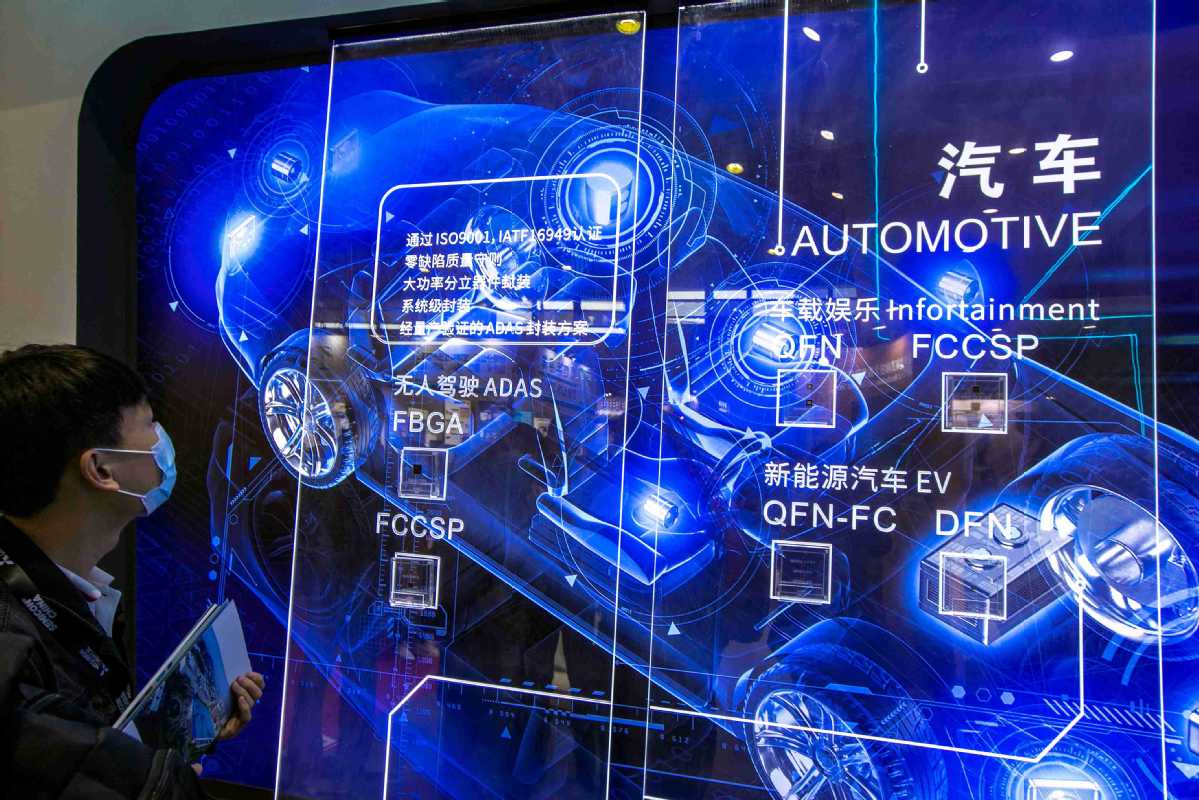Carmakers becoming investors in auto chips
By LI FUSHENG | China Daily | Updated: 2022-03-16 09:26

Shortage drives new thinking that may see self-sufficiency as leading strategy
Several major Chinese carmakers are investing in semiconductor development and production to insulate themselves from possible future shortages like the ongoing one, given the advent of smart electric vehicles that require more sophisticated chips.
The current chip crisis that started to hurt the global auto industry from late 2020, has affected vehicle production globally, reducing output by more than 10 million units last year. In China alone, output last year fell by 2 million vehicles, according to AutoForecast Solutions.
As chipmakers are revving up production, the situation is now less severe, with production down by 929,500 units this year till Monday, said AFS. But like elsewhere, carmakers in China are still feeling the pinch.
China's two largest private carmakers, Great Wall Motors and Geely, reported sales plunges in February because their supplier Bosch had failed to secure enough chips to produce electronic stability systems.
Wang Fengying, president of Great Wall Motors, said micro-control units, or MCUs, are the primary items on the shortage list.
"They are usually 55(nanometer) ones, much simpler than those used in consumer electronics, but are much more demanding in reliability," Wang said.
The high-end chips pack more processing power into a given space.
She said such chips are $1 to $3 per piece, and thus less profitable than those used in the latest phones and computers, so chipmakers are not motivated enough to produce them.
"We are working with Bosch and chipmakers to raise their production to solve our problem," said Great Wall Motors in a comment on its February sales.
There is no better fix than asking chipmakers for help because of technological hurdles and time needed to enter the sector.
Xu Chao, vice-president of Chinese chipmaker SemiDrive, said even if the plants are ready, it usually takes two to three years to develop and launch an auto-grade chip.
But the current crisis and their inability to solve it have made carmakers realize they should do something themselves as cars are becoming electric and smart, which means they will require a greater number of more sophisticated chips.
Ondrej Burkacky, a McKinsey partner, estimates that chips used to enable autonomous driving functions are expected to generate $29 billion in revenue by 2030, up from $11 billion in 2019.
Great Wall Motors became an investor in Beijing-based chipmaker Horizon Robotics in February 2021 and led a financing round of Hebei province-headquartered Synlight Crystal in December the same year.
Horizon specializes in autonomous driving chips and takes international giants Nvidia and Mobileye as its rivals.
Last year, it unveiled an auto-grade processor-Journey 5-designed for L4, or level 4, autonomous driving, with up to 128 tera operations per second of AI computing power.
In January, SAIC Motor, another shareholder of Horizon, established a fund with a local institute in Shanghai to promote chip development.
The fund is worth "billions of yuan", said SAIC. The carmaker, which was among the first to be hit by chip shortages in China, said it has helped local development of 75 chips and their introduction into its vehicle models.
SAIC said China is highly reliant on chip imports, with up to 90 percent of auto-grade chips required being from international chipmakers.
Siengine, a joint venture by chipmaker Arm and EcarX, which is owned by Geely Holding Group, will launch its first auto grade seven-nanometer system-on-chip products in the third quarter.
They will be used for smart cabin functions. The company said it will roll out two five-nanometer high-performance chips from 2024 to 2025. One of them, with a computing capability of 256 tera operations per second, will be used for Geely's autonomous vehicles.
Wang at Great Wall Motors said the long-term solution to ensure chip supplies is to put in place a mechanism in terms of attracting and cultivating professionals.
"We need a strategic plan at the very top so that we can cultivate semiconductor professionals wave after wave to keep pace with the changes on the frontiers," she said.
























